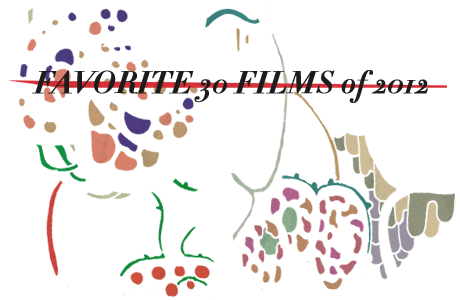We celebrate the end of the year the only way we know how: through lists, essays, and mixes. Join us as we explore the music and films that helped define the year. More from this series
Let’s all just admit that 2012 started to get a little weird towards the end. At least Stateside, anyway. There was all that unpleasant political stuff going on; somehow rape became a gift and then it was bad again; and there was that inclement weather along the East Coast that totally had nothing to do with man-made climate change. Amid all this socialecological turmoil, we shouldn’t blame you for missing some pretty big news in the world of cinema. But we will, anyway.
After all, this year we said goodbye to one controversial auteur (Béla Tarr) and adopted a different personal pronoun for another (Lana Wachowski). Whit Stillman finally made another film after a nearly 15-year hiatus (Damsels In Distres), brilliantly showcasing the talent of Generation Me’s answer to Chloë Sevigny (Greta Gerwig). Plus, any year that a Zachary Oberzan film comes out (Your brother. Remember?) is a good year for movies. Thankfully, all that Mayan apocalypse dreck ran its course a couple years ago, leaving room for some more rarefied grapplings with the end of all things (Tarr’s number-one stunner, The Turin Horse). And all that IRL political stuff we mentioned earlier? Not nearly as troubling as 5 Broken Cameras or This Is Not A Film, movies that managed so brilliantly to elucidate the very real human loss of geopolitical conflict.
But what really blew us away this year weren’t the super-good films that defied convention or made grand political statements. Instead, we were left with our mouths agape by films helmed by auteurs confident enough to be okay simply ignoring convention, never feeling the need to prove anything outside the piece of work at hand, some of which were at ease merely reveling in the sheer virtuosity of their principal actors’ performances (The Master). Oh, and Béla, you’ll be missed.
30. 5 Broken Cameras
Dir. Emad Burnat and Guy Davidi
[Kino Lorber]

In a just world, 5 Broken Cameras (TMT Review) would be shown in classrooms and recommended to the general audiences rather than strictly remaining in the hands of critics and political activists. But, as evidenced by this polemical (and understandably partisan) documentary, we are divided by ideologies and borders that are caught in a cycle of being constructed, destroyed, and rebuilt despite our noble protests. Justice is an ideal, not always a shared commodity. We witnessed this illusion through Emad Burnat’s shaky lenses, again and again and again. We watched the citizens of a Palestinian village on the West Bank as they peacefully stood their ground every week for five years, while settlements rose in place of their burned and uprooted olive trees. They were pummeled by rubber bullets and choked on teargas. When Hummers rolled through their chalky streets, the community rallied and held firm, stoking the ire of the police and drawing in the riot squads. But 5 Broken Cameras was more than a portrait of power relations. It was an autobiographical statement of the domestic costs of conflict that asked us to consider those who will inherit the land and those who will be banished from it.
29. The Day He Arrives
Dir. Hong Sang-soo
[Cinema Guild]

Why do we repeatedly reenact the unpleasant experiences of our lives? What lies behind our compulsion to repeat what Freud described as the obscure motivations that go beyond the pleasure principle? The Day He Arrives (TMT Review) seemed to take its inspiration from these questions. In the movie, a cinema director (Sungjoon) returned to Seoul to meet up with an old friend, and from then on, they performed the same routine every night: go to the bar with a lady friend, with Sungjoon noticing how the barmaid resembles his former girlfriend. The actions of each night seemed to not have any effect on the next, and only slight variations occurred each time. In this anti-Groundhog Day scenario, there was no resolution in sight, no way out of our self-imposed vicious circles. Sang-soo is not known for his subtlety, and the message here was clear: we are doomed to forget our mistakes, to forever attempt to derive pleasure from the inevitably frustrating repetition compulsion.
28. Abendland
Dir. Nikolaus Geyrhalter
[Nikolaus Geyrhalter Filmproduktion]

Over the last decade, Austrian filmmakers such as Ulrich Seidl (Tierische Liebe), Michael Gottwald (Workingman’s Death), and Nikolaus Geyrhalter (Unser Täglich Brot) have been quietly developing a form of documentary that’s fast becoming one of the most innovative and incisive styles of contemporary filmmaking, built around withholding explanatory voice-over and carefully staged shots and scenes that rest in an uneasy space between cinema verité and art-house fiction filmmaking. This method has found its masterpiece in Geyrhalter’s deliriously complex yet utterly straightforward Abendland (TMT Review). Taking images culled exclusively from Europe at night as its material — CCTV, rave, childbirth, Oktoberfest, police training, sex work, UN meeting, etc. — Abendland took Europe’s spaces and spatial relations as its raw material/content/media rather than its citizens. Geyrhalter remains a master of the evocative shot, and thus the spaces remained real spaces with real humans in them, rendered with crystalline clarity, sometimes crushingly sad or quietly funny. But form and superstructure superseded the film’s human subjects in all technical aspects. A lurid attempt at subjugating a filmmaker’s perspective to that of nationalism/socialism/capitalism, the viewer’s eye became that of capital itself. Neither a simple retread of the 1950s’ “direct cinema” nor an “essay film,” Abendland made the far bolder step of performing a simple reframing, of calmly shifting our eye. No message, just endless content. No narrative, just endless situations. Far-reaching, damning, and completely gorgeous by its own rules, Abendland was one of the finest documentaries of the year.
27. Alps
Dir. Yorgos Lanthimos
[Kino Lorber]

Almost the inverse of his previous film Dogtooth, Yorgos Lanthimos’ equally unsettling Alps (TMT Review) concerned itself with a character running towards a fictional existence, rather than away from one. A socially isolated nurse living with her aging father joined a secret group calling itself “Alps,” which hired its members out as temporary replacements for people’s recently deceased loved ones as a stop-gap coping mechanism to ease them into the grieving process. As the protagonist sank deeper into her fictional identities, the line between her real life and her false lives began to blur. The potential for trite Hollywoodisms in such a story was ripe, but that’s not the director we were dealing with. Instead, the spiral into neurosis was handled with quiet reserve and a calm, almost passionless lens. Lanthimos himself might see Alps as the thematic opposite of Dogtooth, but we recognized a stark tonal similarity wrapped up in wan imagery, emotional disconnect, and abrupt, gut-wrenching violence, both physical and emotional. The uneasy marriage of the slapstick and the bleak may become his hallmark.
26. The Loneliest Planet
Dir. Julia Loktev
[IFC Films]
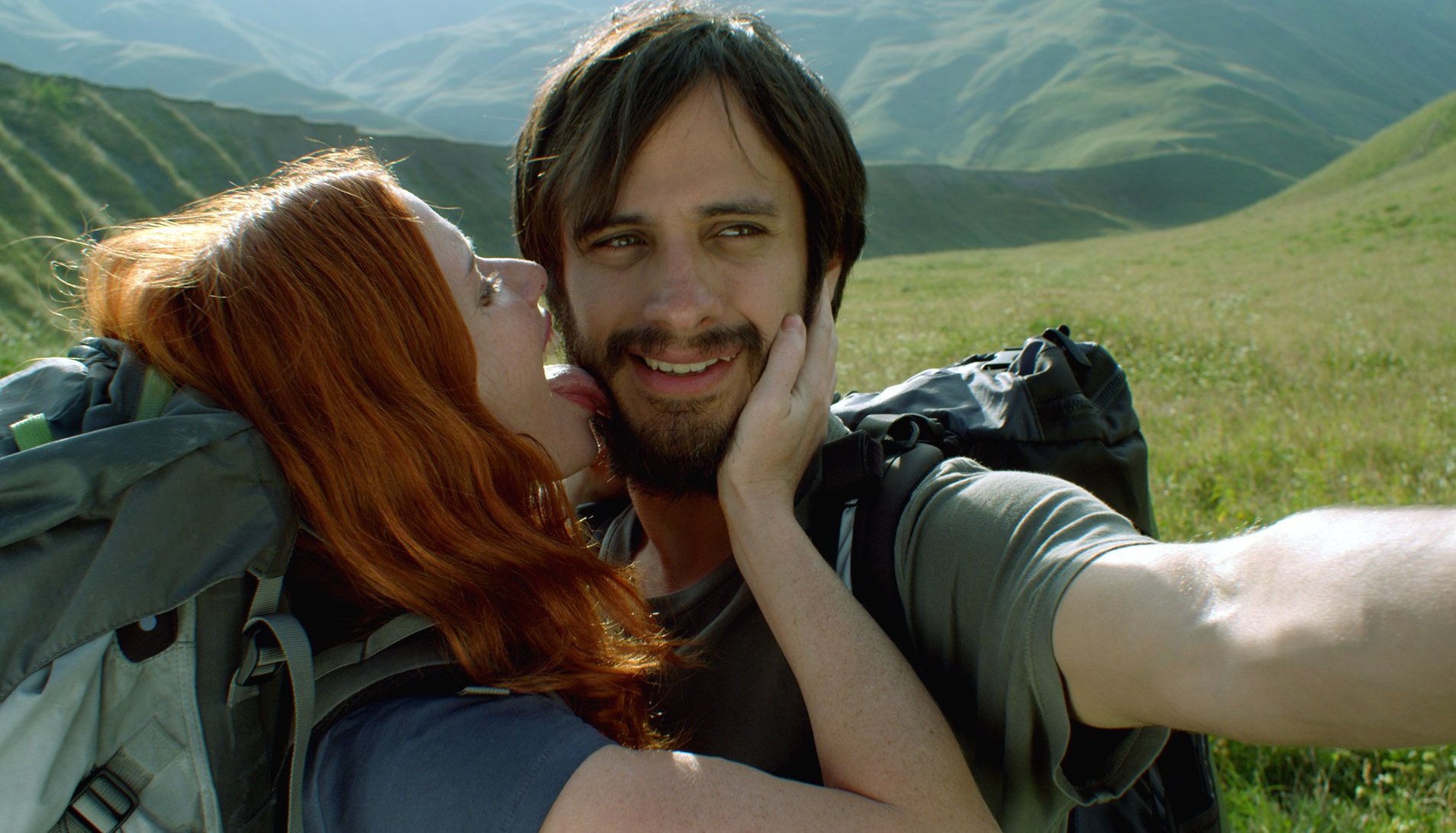
Our romantic relationships require constant adjustment and calibration. Depending on the timing, a simple touch on your lover’s shoulder could lead to comfort or flared anger. The Loneliest Planet, (TMT Review) the quietly moving drama from director Julia Loktev, examined these moments with dispassionate interest. She didn’t give much detail about the lives of Nica and Alex, the couple who hiked through the Caucasus Mountains with Dato, their guide. They were happy when their journey began, particularly when they fucked with messy joy in their tent. A pattern developed: first we followed the hikers closely, then there were languid shots where Loktev filmed them from a distance so we could better appreciate the stark beauty of the mountains (the space between the hikers was a subtle sign about how their relationships shift). Her patient, hyper-realistic filmmaking reached its peak during a jarring sequence of suspense, in which Alex’s poor reflexes put their relationship in a tailspin. We never heard them talk about what happened; Loktev had them heal in restrained, lateral ways. In a year where the biggest films assaulted audiences with incident The Loneliest Planet stripped away conventional narrative, but its message was plain to see for those patient enough to look.
25. Neighboring Sounds
Dir. Kleber Mendonça Filho
[Cinema Guild]

No film this year subverted my expectations quite like Neighboring Sounds (TMT Review), the phenomenal first feature by Brazilian critic-turned-director Kleber Mendonça Filho. With its “interlocking stories”-style narrative and overarching theme of class resentment, it was the kind of film that, at least on paper, might seem indistinguishable from others that made their way around the international festival circuit. Even the vague title suggested a lesser work. But after just several minutes, once it had become apparent just how crucial a role “sound” actually played into the film’s framework, I was utterly transfixed by the uncanny, bewitching atmosphere. Neighboring Sounds never exactly thrilled; it hummed, buzzed, whirred, and throbbed. Filho has a real knack for investing the most mundane of circumstances with humor and intrigue, as even a tenant meeting achieved a sort of mesmerizing absurdist quality. That’s the kind of filmmaking gift that doesn’t come around as often as you’d think. More than a merely auspicious debut, Neighboring Sounds, in its wholly unique way, was as fine a portrait of contemporary Brazil as we’ve seen to date.
24. Bernie
Dir. Richard Linklater
[Mandalay Entertainment Group]

Based on a Texas Monthly article by the great true crime journalist Skip Hollandsworth, who co-wrote the movie with that essentially Texan filmmaker Richard Linklater, Bernie (TMT Review) might be the most quotidian murder story ever put onto (independent) film. It was made for just $6 million, yet stars three major actors (two currently popular, Jack Black and Matthew McConaughey; one former starlet, Shirley MacLaine), and though it has the ostensible characteristics of a crime drama — vague waftings of some mid-80s In the Heat of the Night rerun permeate the plot — it was this year’s most sympathetic portrait of small-town America, where social life revolves around equal parts church and gossip. Bernie Tiede (Black) was an unflappably affable mortician in Carthage, Texas whose genuine concern for the well-being of everyone around him couldn’t have been better contrasted than against the cruel cantankerousness of MacLaine’s Marjorie Nugent, a wealthy widow whom Bernie befriended, served, and, against every natural tendency in his body, coldly killed and then stuffed into a deep freeze. The movie was a mixture of the kind of matter-of-fact black-humor that Black does best when working with Linklater (an actor’s director if one exists in America today) and interviews with actual Carthage residents, who knew the real Bernie Tiede. Bernie was so perfectly, effortlessly common that it very nearly justified murder.
23. Planet of Snail
Dir. Yi Seung-jun
[Kino Lorber]

I’ve only watched Planet of Snail (TMT Review) without English subtitles. I’ve only watched it in (if it can even be said) its native tongue. So, the last time I watched the film, I made a list of things for which subtitles serve no meaningful function, anyway: the private language of hands, patience, the disappearance and reappearance of sunlight, sand entombing a body, the sound of waves, gentleness, missing teeth, the distance between bodies, loneliness, wedding rings, aiming in the dark (or is it light?), giggling, a shared meal, impressions of bark, frustration, a pinecone. The list goes on. It goes on and spirals into itself, until it breaks off into nothing at some unseen point. I’ve had to look up small details to fill in the gaps (names, mostly). Often, they seemed irrelevant. In his wonderful review, Tim Terhaar talks briefly about our prioritization of the visual, our conceptual reliance upon it, and the way in which we confuse its weaknesses as advantages. Yes, it absolutely helps to have both height and sight while changing a lightbulb, but that only gets you so far. For example, it was the unblind woman who ran into the deafblind Young-Chan, not the other way around.
22. Amour
Dir. Michael Haneke
[Sony Pictures Classics]

Anne and Georges, the elderly subjects of Michael Haneke’s Amour, were mostly happy when the film began. They attended a concert, and Georges surprised Anne with a genuine compliment after returning home. Then something strange happened to Anne — she had a stroke but didn’t know it — and the connection between the couple temporarily severed. From there onward, Haneke regarded Georges and Anne with brutal precision. He showed us the difficult, matter-of-fact indignities of caring for someone after their body fails them. Anne fought to preserve her beloved independence, and it was wrenching to watch her acquiesce to death. Initially, Haneke’s camera glided through the couple’s posh Paris apartment, giving an airy sense of space. But in the closing scenes, the walls felt like prison bars. There was no world for Georges beyond Anne, whose life had become an unknowable nightmare. While Amour was disturbing and tragic material, Haneke’s compassion for the couple mirrored what Georges felt for Anne. He was determined to show how love, not romance, ekes through the atrophy and the shit. He also reminded us that, while love conquers all, the messy battle is not for the squeamish.
21. Prometheus
Dir. Ridley Scott
[20th Century Fox]
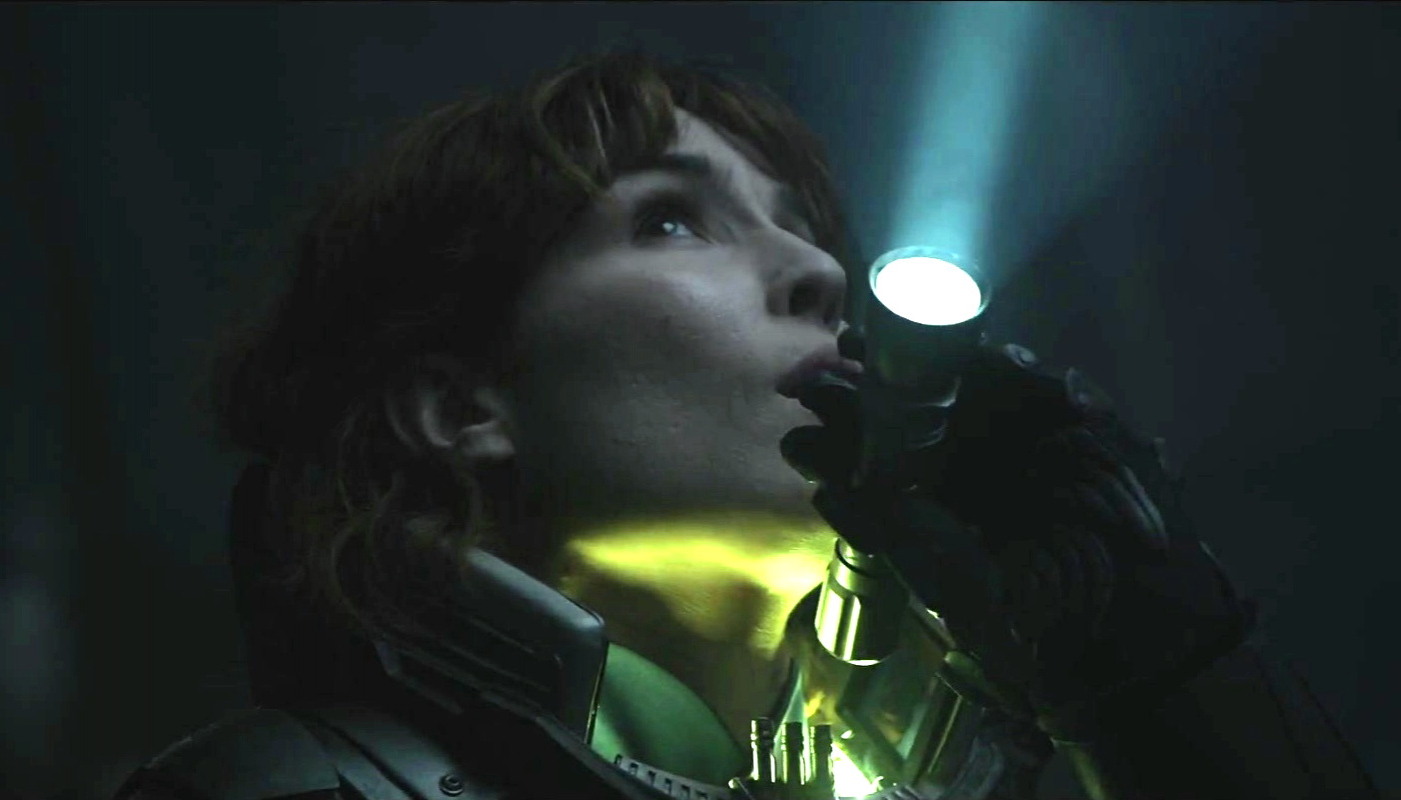
Ridley Scott’s long-awaited re-entry into the Alien universe was easily his most ambitious to date and by far his most visually striking. Criticized by some due to an ostensibly confusing and muddled plot, narrative ambiguity suited Prometheus (TMT Review) well, engrossing viewers with a terrifying journey into the unknown, as a party composed of scientists and members of a shady corporate enterprise (as well as the inevitable android, magnificently played by Michael Fassbender) traveled across the galaxy seeking an answer to the ultimate question: Why do we exist? The fact that Ridley Scott purposely denied an answer to such a question (during one of the most disconcerting scenes of the year) was a welcomed change from the worn-out truisms of mainstream film. It also showed that there is often much more power in the unknown than in an inevitable underwhelming resolution. Just like last year, audiences usually had to look outside of Hollywood for cinema that was both thought-provoking and boundary breaking. Prometheus was one of the few pleasantly terrifying exceptions.
20. Cosmopolis
Dir. David Cronenberg
[Entertainment One]
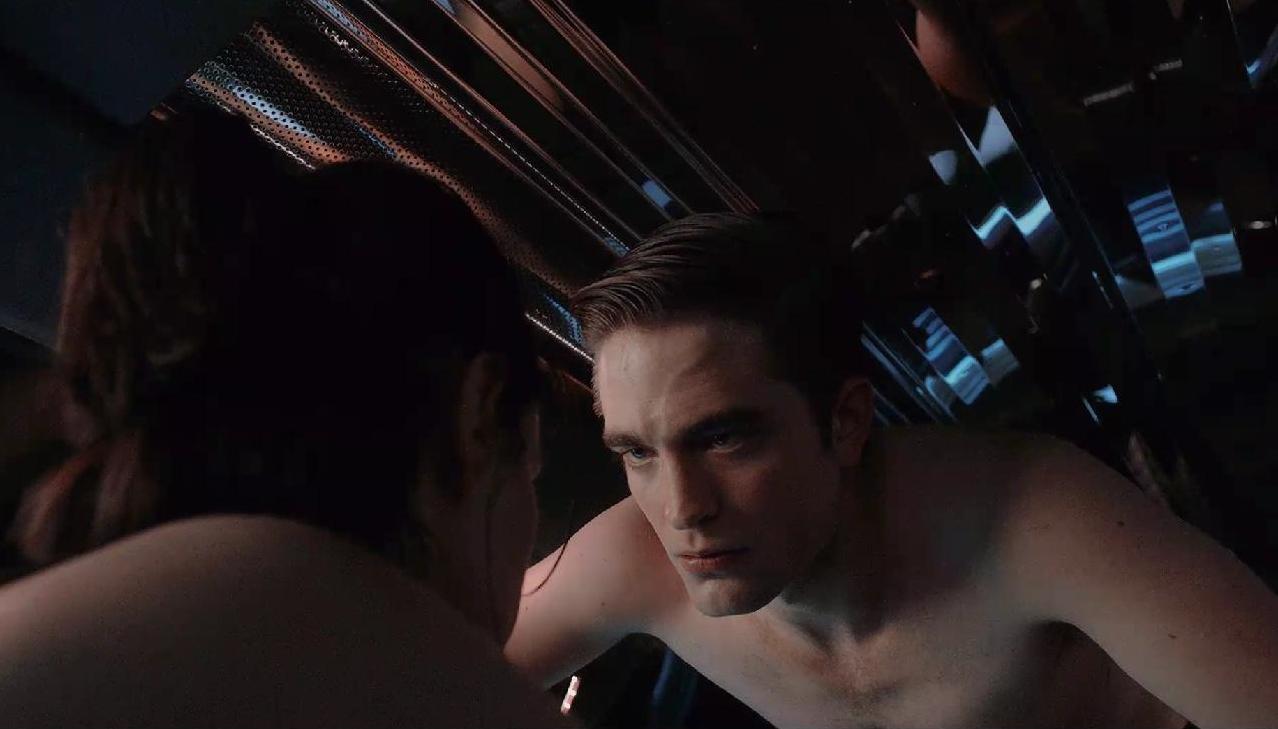
Perhaps David Cronenberg’s best film since A History of Violence, Cosmopolis (TMT Review) was also one of his most offbeat and humorous. With the help of Robert Pattinson’s brilliantly stoic performance, a crisp and icy color palette, and an ineffably off-kilter tone, Cosmpolis transformed the interior of a limousine, where the first hour of the film took place, into a universe unto itself. A veritable hyperreality of futuristic global capitalism that seemingly operated outside the confines of time, this living, breathing entity thrust Pattinson’s Eric Parker through Manhattan to his favorite barbershop, where he was seemingly immune and indifferent to the chaos and danger of the protests, riots, and crime occurring just on the other side of the glass. His crosstown odyssey was filled with a bizarre array of characters feeding him raw data, tactical advice, and philosophical quandaries, as he gazed at them with similar aplomb, even while getting his prostate examined or taking a pie to the face. The film’s final act, where Parker confronts the outside world, capped off what may be the single most effective examination of the unbridgeable gap between the elite and the 99% of this young decade, and while Cosmpolis did not enjoy the heaps of praise most of Cronenberg’s recent output has received, its sheer singularity and bold engagement with the political climate — with the help of the equally fine Don DeLillo source material — made it one of the most important films of the year and his career.
19. Patience (After Sebald)
Dir. Grant Gee
[Art Events]
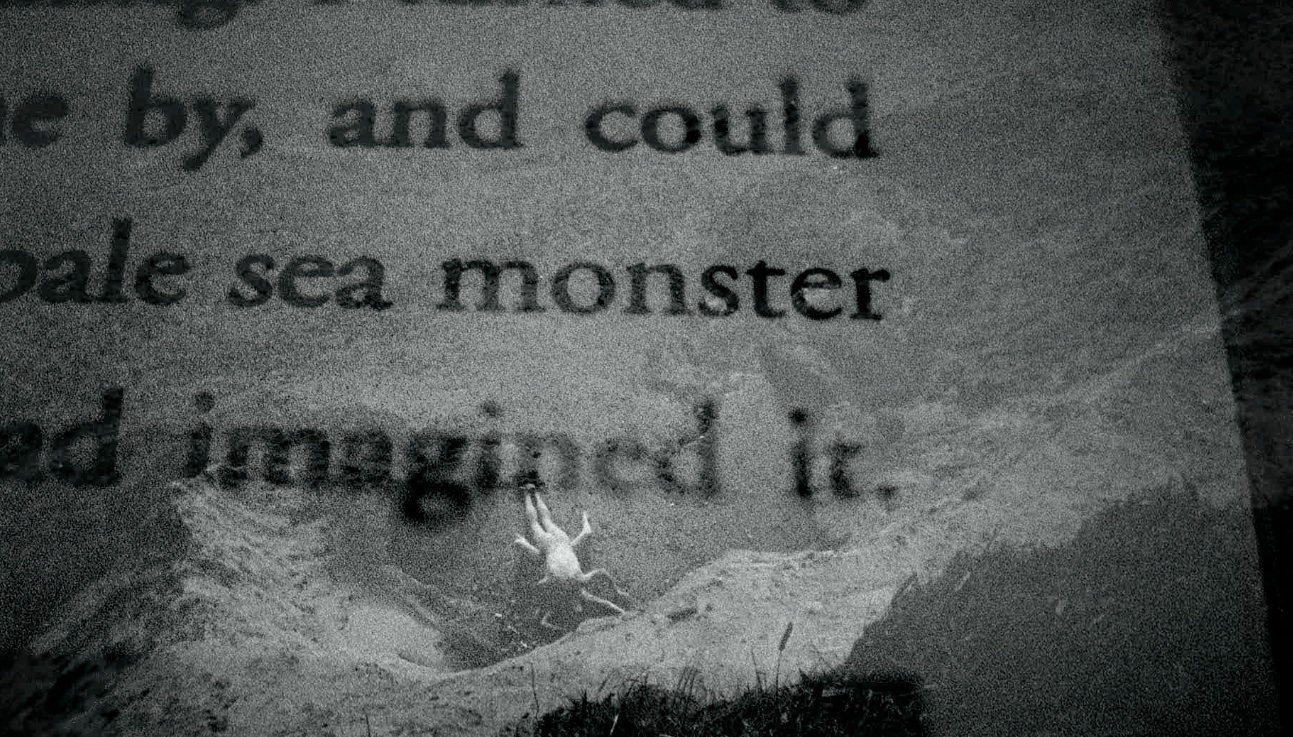
I hadn’t read W.G. Sebald’s The Rings of Saturn when I watched Patience (After Sebald) (TMT Review). But I had read The Emigrants, so I had an oblique point of entry — oblique to my advantage. For me, proxy and trauma were at the heart of Grant Gee’s film about Sebald, Sebald’s book, and the walk that represented the occasion for the book and organized its material. (Well, perhaps heart isn’t the right word after all.) The subtle, insinuating soundtrack (courtesy The Caretaker); the hazy, ominous editing; the commentary of other writers — the film dealt directly, in its way, with dark matters: of Sebald’s economy of circumlocution, of Sebald’s circumambient peregrinations — the necessity of looking down at the road in order to see what has already passed along it, the necessity of telling stories in order to hear the truth. Patience was so titled because it takes patience to remain attentive as you spiral around trauma, roundabout and ever closer to the deaths that punctuate life. European history went up in smoke and so did Sebald, but when we felt them near, Patience helped us approach them.
18. The Color Wheel
Dir. Alex Ross Perry
[Cinema Conservancy]

Rejected by Sundance and SXSW and met with a sharply divisive critical response, it’s easy to see why an independent film like The Color Wheel (TMT Review) had trouble finding an audience. Carried by two patently unlikeable characters and photographed in high-grain black-and-white 16mm, the film’s vitriolic episodes cut into each other like rude interruptions, shot through with moments of surrealism that usually offer no easy (or realistic) way out of increasingly awkward encounters. Talk of “influence” is standard in independent film discourse, but though the title’s typeface is stolen from his early novels and its protagonists are gabby neurotic Jews, The Color Wheel had nothing to do with Philip Roth. So what’s the deal? Alex Ross Perry — who directed, co-wrote, edited, and produced the film — crafted a recession-era screwball comedy that was both formally unpredictable and conscious of its own limitations, an anarchic stream of lies and insults that managed to locate a bleeding heart in spite of its blithe negation of convention. Acerbic to the bone, Perry’s dispassion project was low-budget filmmaking gloriously split at the seams; few films this year were as galvanizing in their lack of self-importance.
17. Michael
Dir. Markus Schleinzer
[Strand Releasing]
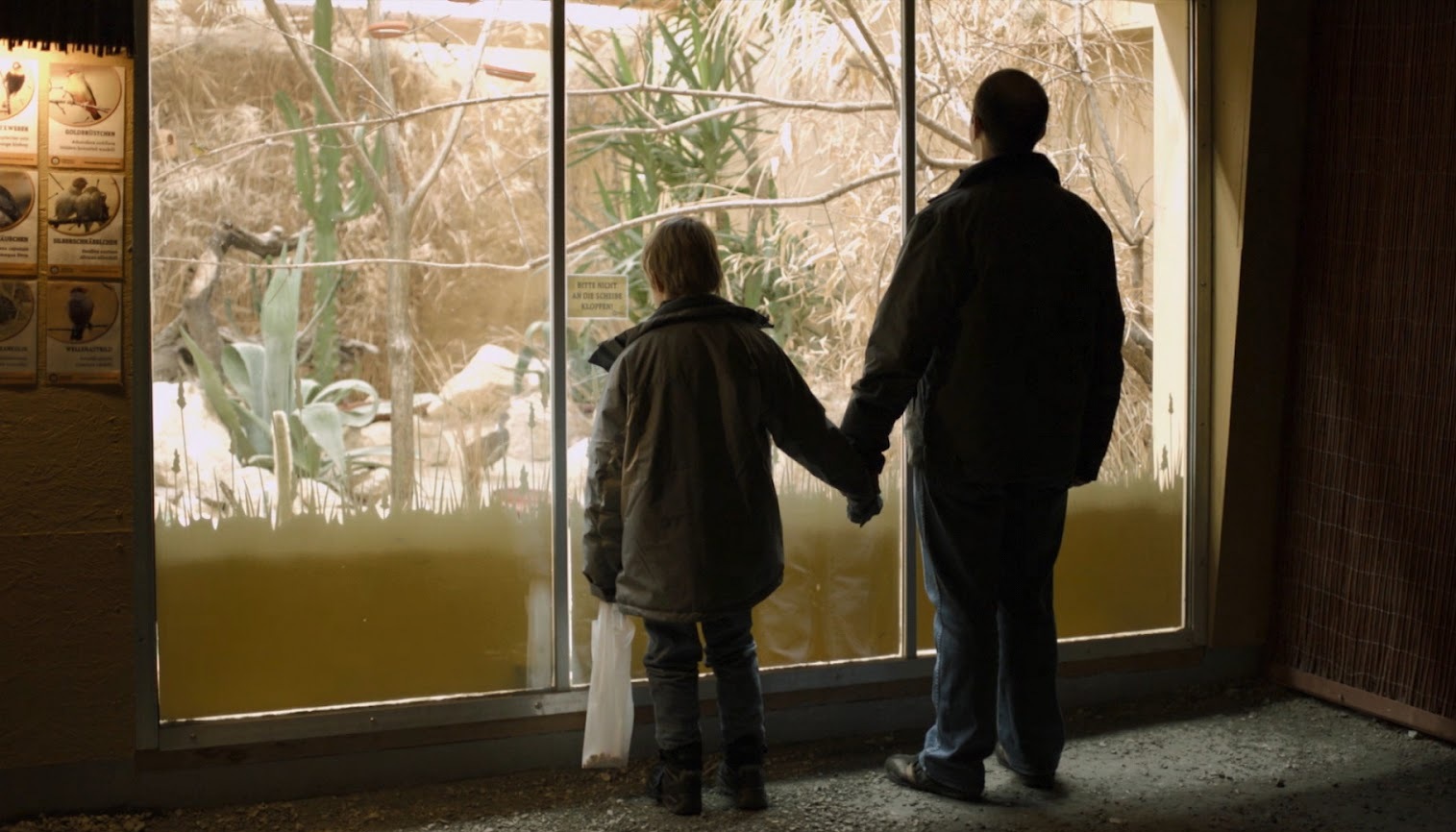
Benjamin Pearson’s blurb about Michael for our mid-year film list was keener-sighted than all the fully-fledged reviews I read, praiseworthy and condemnatory alike. I came to imagine Michael appearing as a long quotation in a chapter in an imaginary book called The Varieties of Domestic Experience. If William James is right, we learn the most about phenomena by examining not their average but extreme manifestations. This film, then, had something important to teach us, considering the extremeness of its content — psycho-sexual-filial — and the average-ness of its representations of that content. (Or as average as could be possible.) We were horrified; then our horror began to congeal into questions, beginning with, What did the criminal pedophile’s mother see when she opened the steel door in the basement? To our dismay, as these questions rippled outward, their centripetal force grew stronger. Questions about Michael’s desire for and control over the captive boy inexorably triggered questions about how we ourselves learned to desire, what kinds of control we endured, and who suffered under the regime we accepted as normal. It hurt to identify with Michael, but identifying with him proved necessary for understanding. And if we didn’t want to understand, how could we say we’d prefer a world in which Michael didn’t imprison Wolfgang?
16. Magic Mike
Dir. Steven Soderbergh
[Warner Bros. Pictures]

Something strange is happening in the career of Steven Soderbergh. Directors are supposed to get increasingly esoteric and set in their ways as they mature — not so for the Sex, Lies, and Videotape wunderkind, who seems to get more open-minded and flexible with age. Literally flexible in his latest, Magic Mike (TMT Review), a meld of post-recession Florida realism and Step Up with strippers. The script was a clunker, but Soderbergh’s film was improbably good. Credit goes to the puppy dog charisma of Channing Tatum and the diesel bodies of Tatum and his cast, whose costumes, choreography, and sweet, sweet moves took Club Xquisite’s Male Revue above and beyond. Most surprising was Matthew McConaughey, who went full-Franco this year, showing a startling range of freakiness in his work. In Magic Mike, he played Dallas, the leader of the Cock Rocking Kings of Tampa, and he threw himself into it — the yellow spandex, the silk kimonos — without a hint of winking irony or self-consciousness. Combined with Soderbergh’s expressive, fluid cinematography, Magic Mike was like a 1980s throwback, an earnest and unabashedly fun movie. On a miniscule $7 million budget, it earned over $150 million worldwide, guaranteeing a Magic Mike Takes Miami in our future. We’re already saving our dollar bills.
15. Kid With A Bike
Dir. Jean-Pierre and Luc Dardenne
[Sundance Selects]

In its first scene, Kid With A Bike (TMT Review) shapes an immediate distinction in perceived reality between the audience and the film’s main protagonist, Cyril, who persisted in attempting to telephone his father, despite what he heard on the other end of the line. The child was desperate, inconsolable, and disconnected from the evidently bitter truth that slowly engulfed his surroundings as a consequence of abandonment. This inert detachment was injected further into that contrast, which pitted doc-tinged filmmaking so tactfully deployed by the Dardenne brothers against the stubbornness of their principal character, who continued to challenge the painful fate his father had dealt him. The camerawork was shaky, handheld, and minimalist, adding to the looming disenchantment the boy was exposed to through longing for reunification with his dad. Although Cyril’s actions led to misfortune and subsequent exasperation, the Dardenne brothers’ wonderful direction allowed for fleeting instances of reverie as a means of escaping frustration, sympathy, and strain, with relationships graciously forged and meticulously tested. In a climatic end-scene, Cyril rode down a hushed backstreet at night, passed parked cars and shop windows, his bright red t-shirt puffed out in the evening frisk where a spectacular meditation ensued. The image was outstanding, a moment of bleak triumph in the face of better judgement, and one of the pinnacle sequences that made Kid With A Bike such a success.
14. Monsieur Lazhar
Dir. Philippe Falardeau
[Music Box Films]

The first time we saw Bashir Lazhar, the protagonist of Monsieur Lazhar (TMT Review) outside of the school grounds, he was retrieving a package full of his wife’s belongings. Before picking up the box, he fumbled a display of colorful stickers, similar to those handed out by the teacher he was replacing. Lazhar’s family passed away under horrific circumstances, and the teacher he succeeded killed herself in the very classroom where he worked, but the connection he gradually formed with his inquisitive pupils was caring, delicate, and heartening. Through the guise of a script concerned with zero-tolerance policies, the national curriculum, and an unexplained suicide, a powerful plot ensued about terrorism, torture, and human rights, which was ultimately brought to the fore of this absorbing film. While the kids came to terms with Mademoiselle Martine’s death through support sessions, Lazhar committed himself to building a malapropos relationship with the children as he grieved for his wife and family. With spectacular performances by Mohamed Saïd Fellag as the lead and Brigitte Poupart as Claire — a fellow teacher — this intricate tale wonderfully bound such differing and complicated themes side-by-side. At no point did the grief expressed by both Lazahr or the children seem forged or unhinged, nor did the film show signs of carelessly flitting between the demanding issues it raised. Instead, director Phillipe Faladeau packed the story together brilliantly like a prepossessing chrysalis gently coming undone at the seems, whence a steadfast, tender, and thoughtful production emerges.
13. The Comedy
Dir. Rick Alverson
[Tribeca Film]

More than four years after Adbusters published its preposterous denunciation of “the hipster,” we still find ourselves in a paradoxical state of simultaneous derision and exaltation of the contemporary flâneur. Rick Alverson’s latest film meditated on this paradox, daring viewers to identify with a slovenly, overprivileged Williamsburg nihilist as he attempted to neutralize his terminal ennui by subjecting others to obscene, racist diatribes and drunken shitshows. Tim Heidecker as Swanson brilliantly and fearlessly embodied the contemporary existential crisis, exposing a deep reservoir of impotence and angst at the core of his vile buffoonery. The HD cinematography stared unflinchingly at Heidecker, his cohorts, and his procession of unwitting victims, using documentary techniques to transpose comedic structure, continuously deferring every punchline to devastating effect. In its avoidance of any sort of redemptive (or punitive) arc for its central character, The Comedy (TMT Review) became radically subversive, making its audience complicit in enabling Swanson’s decadent apathy, challenging us to acknowledge our own lapses into self-absorption and emotional petrification.
12. Looper
Dir. Rian Johnson
[Film District]
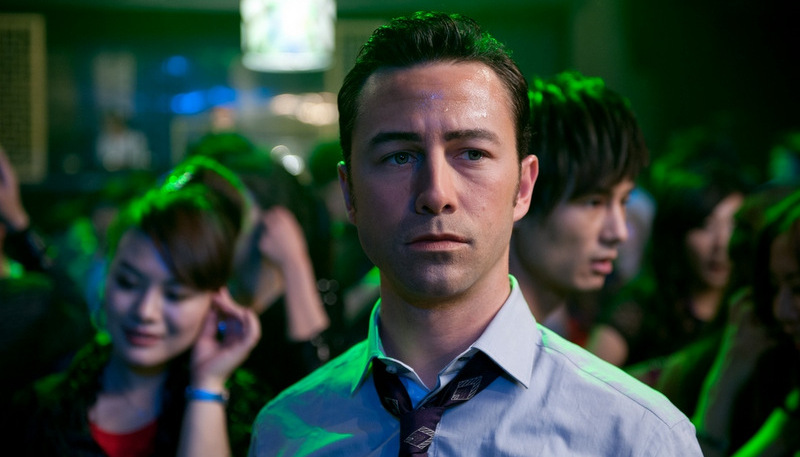
Relatively early in Looper (TMT Review), Bruce Willis tells Joseph Gordon-Levitt that he doesn’t want to talk about time travel. He’s ostensibly talking to his younger self in a diner — while absolutely wasting two plates of steak and eggs — but he might as well be talking directly to the audience. It’s a smart move. Any attempt to answer the how of time travel will inevitably end up unsatisfactory at best and completely derailing at worst. Instead, director Rian Johnson used his sharp sci-fi noir to hone in on the motivations and consequences of time travel. The desire to jump back in one’s history is arrogant and selfish, as it places one’s personal story above others and ignores its effects on their lives. But it’s also ultimately very human and relatable. We could see it in how the very different interests of one man at different ages conflicted with each other, even as Willis and Gordon-Levitt physically shared very little onscreen time together. The two encircling each other made for excellent pop-art, but it was those ethical questions that made it stick in your gut.
11. Holy Motors
Dir. Leos Carax
[Les Films du Losange]

“What is going on?” I wondered throughout the confounding first reel of Holy Motors (TMT Review). For some odd reason, mostly based on my fuzzy recollection of the film’s trailer, I mistakenly believed Holy Motors was going to be a slightly quirky, mostly straightforward saga of an ultra-wealthy businessman and his various misadventures about town. Sure enough, after a dreamlike opening prelude, we saw central character Oscar emerge from a mansion wearing a business suit. He said goodbye to his family and climbed into a limo, where he proceeded to conduct what appeared to be business-as-usual over the phone. Yet it wasn’t far into the film when this same Oscar (played by an astonishing, reptilian Dennis Lavant) actually changed into a spandex motion capture suit and started whirling and gyrating around a stage, in a standout sequence that surreally juxtaposed the high-tech with the primitive. Although my initial estimation of Holy Motors wasn’t entirely inaccurate, Oscar’s misadventures were actually referred to as “appointments,” and each one placed Oscar in a different cinematic universe, from gory knife fight to melodramatic musical number. It was a highly conceptual, genre-hopping tour de force and a stirring testament to cinema’s transformative powers. But what made Holy Motors truly stand apart was that, despite its highly referential nature, nothing in it felt like anything we had seen before. Each mini-movie was highly original, subversive, and unpredictable, and Holy Motors’ cumulative impact thusly went far beyond mere spectacle or stunt.
10. Doggiewoggiez! Poochiewoochiez!
Dir. Everything Is Terrible!
[Everything Is Terrible!]
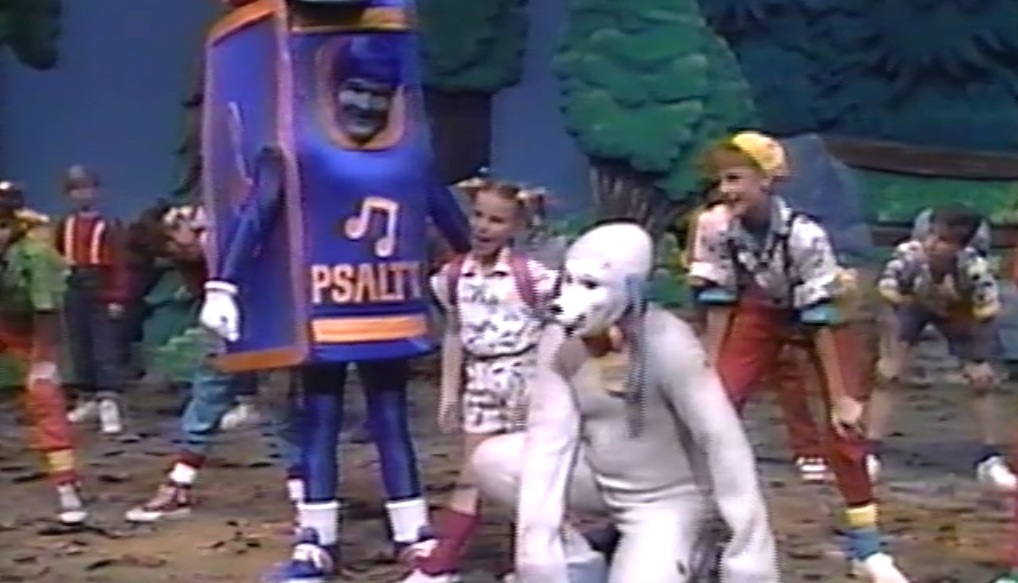
At first, we were a little taken aback by this wondrous monstrosity. A feature-length, (mostly) faithful adaptation of Jodorowsky’s Holy Mountain made entirely from clips of dozens of terrible movies about/starring dogs, you say? Don’t mind if we do! TMT has always been fond of works that question the need for a line between trash and art, which is why it wasn’t at all surprising when we went all tingly over a film that obliterated that line entirely. Sure, the first half-hour was a sensory overload of nearly unparalleled hilarity, but slowly and almost imperceptibly, Doggiewoggiez! (TMT Review) began to approach transcendence. The purely silly rapid-fire clips of cinematic odes to the canines achieved a hypnotic effect, as laughter gave way to awed recognition of some totally other kind of genius. It’s a lovely idea, that a piece of work can be greater than the sum of its parts — and it’s probably lovely mainly because it’s entirely unprovable. And so it was with this, the culmination of years of practice from the found-footage masters comprising the Everything Is Terrible! collective. So far, it’s the pinnacle of their work. But we’re confident it won’t remain so for very long. They’re just getting started.
09. Damsels in Distress
Dir. Whit Stillman
[Sony Pictures Classics]

Leave it to Whit Stillman to bank on traditional filmmaking in a year when convention and formality were bucked relentlessly elsewhere. Damsels in Distress (TMT Review) was so unironically straightforward that one couldn’t help but look for its maker’s smirk. At fictional Seven Oaks College, a small sisterhood tasked itself with regulating an entire university’s moral ballast. Greta Gerwig, already Sevigny’s heir apparent, stepped into the quintessential Stillman role as an insistent, hectoring, easily discomfited young matron; as she introduced and inculcated her new charge (Analeigh Tipton), Stillman showed us a worldview as whimsically conservative and as deftly comical as the one he offered back in 1990’s Metropolitan. His first film in 13 years, Stillman has now perfected the marriage of lecture and comedy; his satire of emotionally hyperbolic undergraduates is flawless, to the point where students try to kill themselves by jumping off the roof of a two-story building. Although cinema came heavy with the ennui in 2012, Stillman’s world gave cynicism no quarter; in Damsels, the height of noblesse oblige came in the form of a new dance craze, and all you needed to purify yourself was quality soap.
08. Beasts of the Southern Wild
Dir. Benh Zeitlin
[Fox Searchlight Pictures]

I feel extremely lucky that I went into Beasts of the Southern Wild (TMT Review) blank. I hadn’t seen a trailer, knew nothing of the plot, and the tidal wave of praise it was getting remained vague hearsay; I just knew “you had to see it!” from friends who had already gone to press screenings. The first time I watched it was like experiencing a Miyazaki film in real life. Director and co-writer Benh Zeitlin weaved harsh realities and colorful fantasy into truth, all with a starry-eyed joy. In the center of all the splendor was a 6-year-old girl named Hush Puppy (Quvenzhané Wallis); like a modern-day Ulysses, she faced beasts (some fantastical, others painfully relatable), travelled to hell and back, learned about death, and eventually understood that being a little piece in a big universe is okay. The tiny Wallis is gargantuan, and it’s her performance (and Dwight Henry’s as her sick father Wink) that kept us so emotionally invested as the film ebbed and flowed from moments of tranquility to explosive peaks of intensity. With its untamed magic, Beasts of the Southern Wild was unlike anything else this year.
07. This Is Not a Film
Dir. Jafar Panahi
[Palisades Tartan]
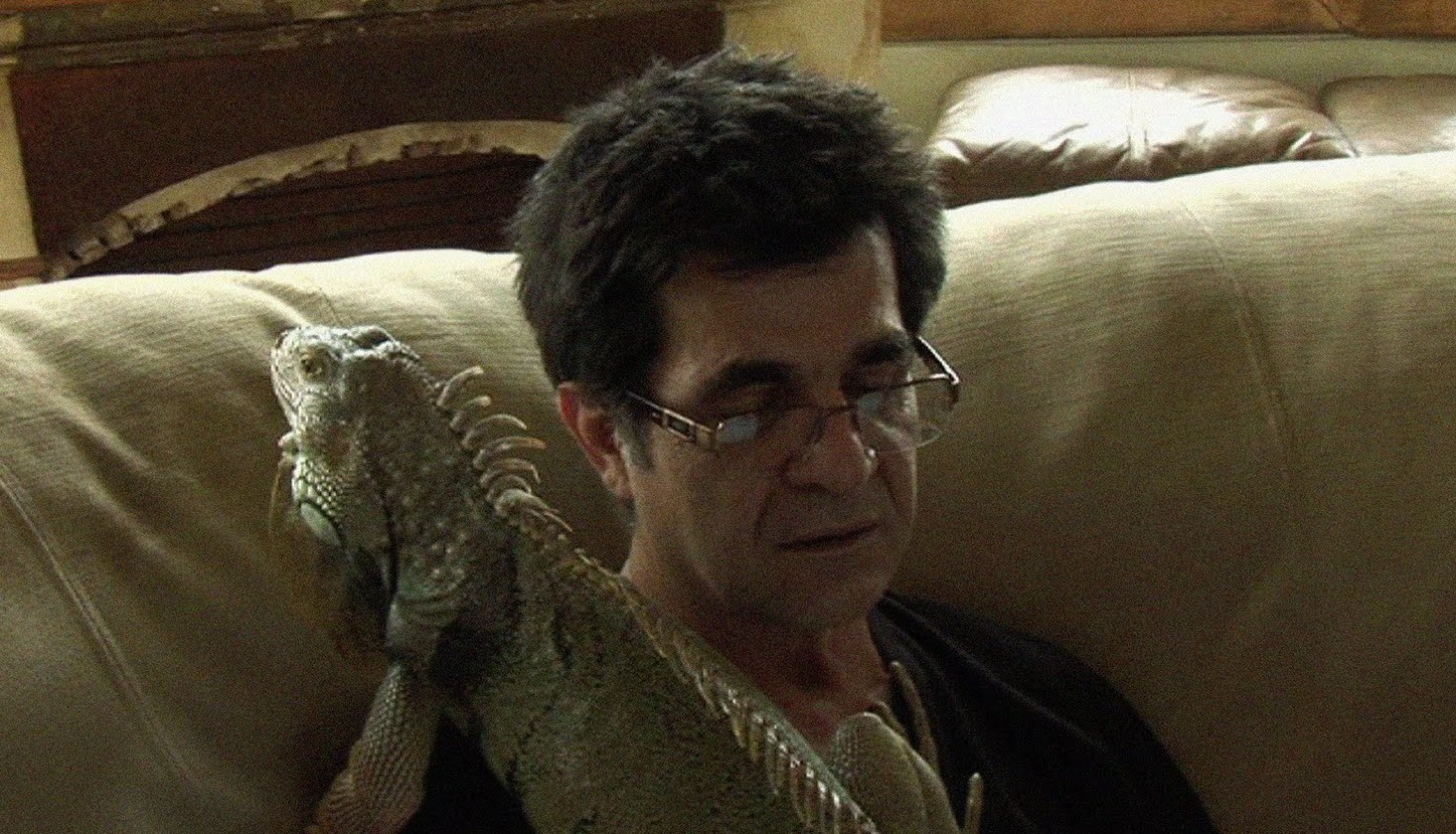
Persian director Jafar Panahi could be sent back to prison at any time. He has 18 years remaining of a 20-year ban from directing, writing, or editing films, because his views don’t jibe with those of Iran’s Islamist government. This Is Not a Film (TMT Review), smuggled out of Iran on a thumb drive hidden inside a cake, was more a successful exercise in civil disobedience than an art piece, and much of its power as a non-film stemmed from this political oomph. Shot partially on consumer-grade DV camera and partially on iPhone, This Is Not a Film was a day-in-the-life-style documentary (or “video diary”) with unusual poignancy for a story that basically showed a guy bored in his apartment all day. Panahi’s quiet desperation under house arrest, awaiting the result of his appeal of that career-crippling sentence, and his claustrophobia, both physical and mental, resonated deeply with Western audiences. This wasn’t the kind of depiction of oppression of the “other” in foreign lands we were used to, but the oppression of someone with whom we could identify. It wasn’t so long ago that Iran had more in common with France (aside from using Magritte as inspiration for film titles) than its regional neighbors, and we feel a deep simpatico with Persians who seem a part of that old Iran, who seem like us.
06. Once Upon A Time in Anatolia
Dir. Nuri Bilge Ceylan
[NBC Films]

The title of Nuri Bilge Ceylan’s latest refers to Sergio Leone’s violent farewell to the Western myth, but though it shared the Italian director’s love of long, expressive close-ups and gorgeous vistas, all of its deaths took place off-screen. What began as a police procedural was slowly abstracted into a folktale without a punchline: a doctor, a prosecutor, and chief of police take a night drive through the vast Turkish countryside to locate a body, but the would-be murderer in the backseat can’t remember where he left it. With its nearly all-male cast and languorous pacing, Anatolia (TMT Review) was the kind of large-scale arthouse film whose absurdist aims are buoyed by a fascinating attention to detail, as the complicated interplay of philosophy and bureaucracy in everyday life constantly crept into its sprawl of stunning images. It culminated halfway through in one of the year’s most beguiling sequences: in the middle of the night, a luminously beautiful woman brought tea to the men in the midst of a village blackout, the candles lighting their dumbly hypnagogic gazes. It would seem that Ceylan, in his aesthetic rigor and thematic tranquility, strove for the purity of images that took on their own mythic qualities.
05. Oslo, August 31st
Dir. Joachim Trier
[Strand Releasing]
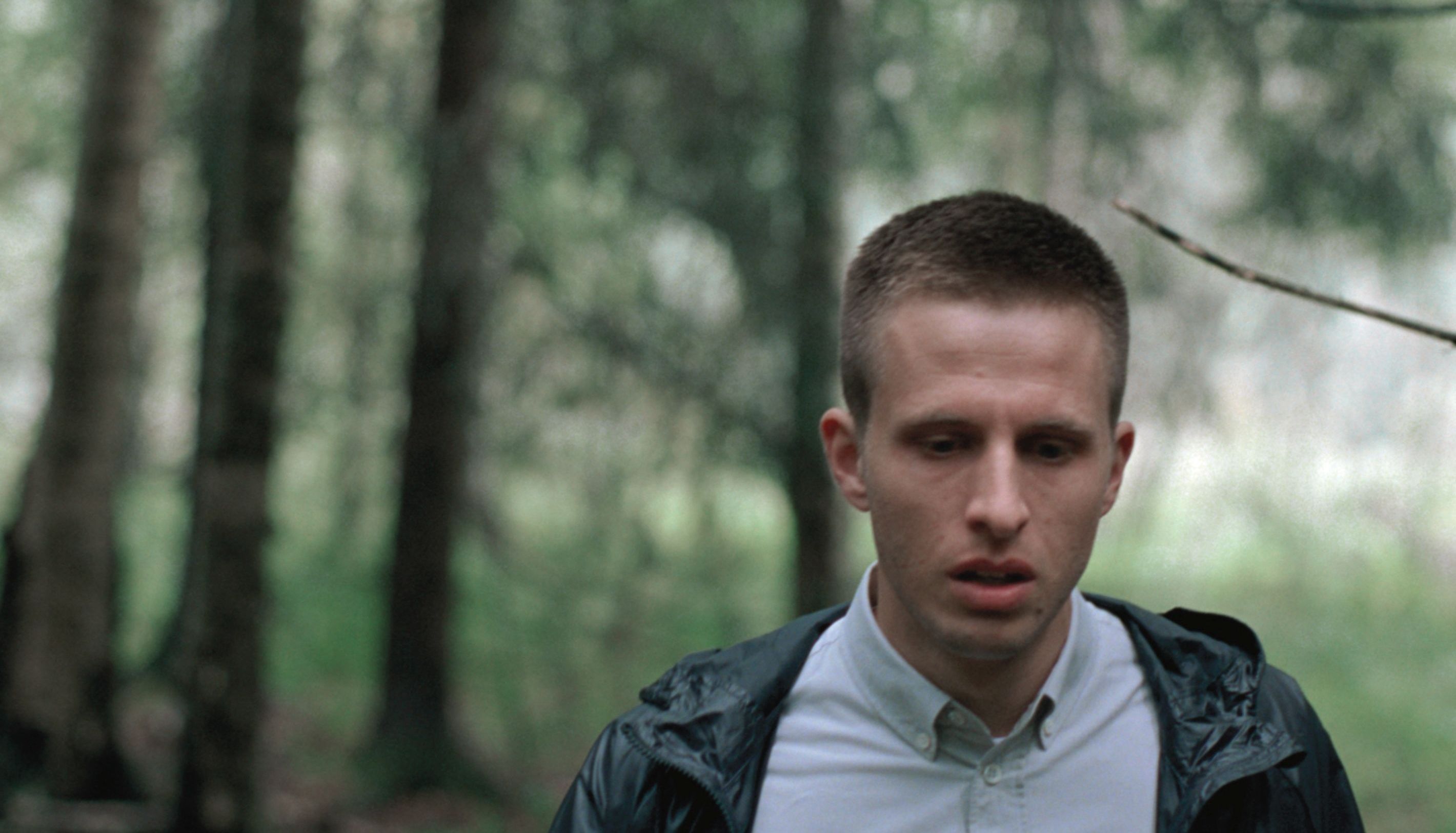
Suicide isn’t a thing to be taken lightly, but director Joachim Trier handled his excruciatingly subtle, detailed account of the final day in a heartbreakingly sober junkie’s life with the respect his material deserved. Anders (Anders Danielson Lie), a heroin addict so tortured by “recovery” that its pain was apparent in his wiry veins and the bones in his face, was released from a rehab clinic on a day pass so that he can interview for a job as a writer at a magazine; before heroin, he was published and on his way to the kind of success he never wanted. But a day pass for this addict is just a new kind of torture, one filled with the faces of the people he took advantage of during the depths of addiction. Trier’s impressive balancing act was to understand his subject — suicide and the wasting of a gifted life — without allowing his audience to wallow in the self-disgust felt by his hero. We understood the way Anders was unable to interact with the world and, at the same time, the way that world simply existed and was nothing spectacularly dark or difficult. Trier was thoroughly in touch with reality and, he declared, so was Anders. Sometimes, Oslo, August 31st (TMT Review) suggested, being in touch with reality really is as difficult as it seems.
04. Your brother. Remember?
Dir. Zachary Oberzan
[brut]

Vying for the title of 2012’s best synthesis of home movies, appropriated footage, and performance art, we have Your brother. Remember? (TMT Review), Zachary Oberzan’s exceptional and immersive examination of brotherhood and the enduring importance of Jean Claude Van Damme’s Kickboxer. While in their teens, Oberzan and his brother Gator reenacted scenes from that gloriously awful film with a clunky camcorder and innocent ardor. Twenty years later, they revisited those clips and attempted to recreate them as accurately as possible, with Gator about 50 pounds heavier and with just as much enthusiasm. When they weren’t practicing their clumsy style of martial arts, Gator was musing about his addictions and stints in prison and praising his younger brother for breaking into the art world. Oberzan evoked relaxed and heartbreaking confessionals from Gator that eliminated the barrier between viewer and subject. We empathized with him in part because those of us who grew up making naïve videos and idolizing since-fallen stars could relate. As the disjointed format played with our memories, Gator became someone we knew: a distant cousin, the clerk at the convenience store back home, maybe even our own brother.
03. Moonrise Kingdom
Dir. Wes Anderson
[Focus]
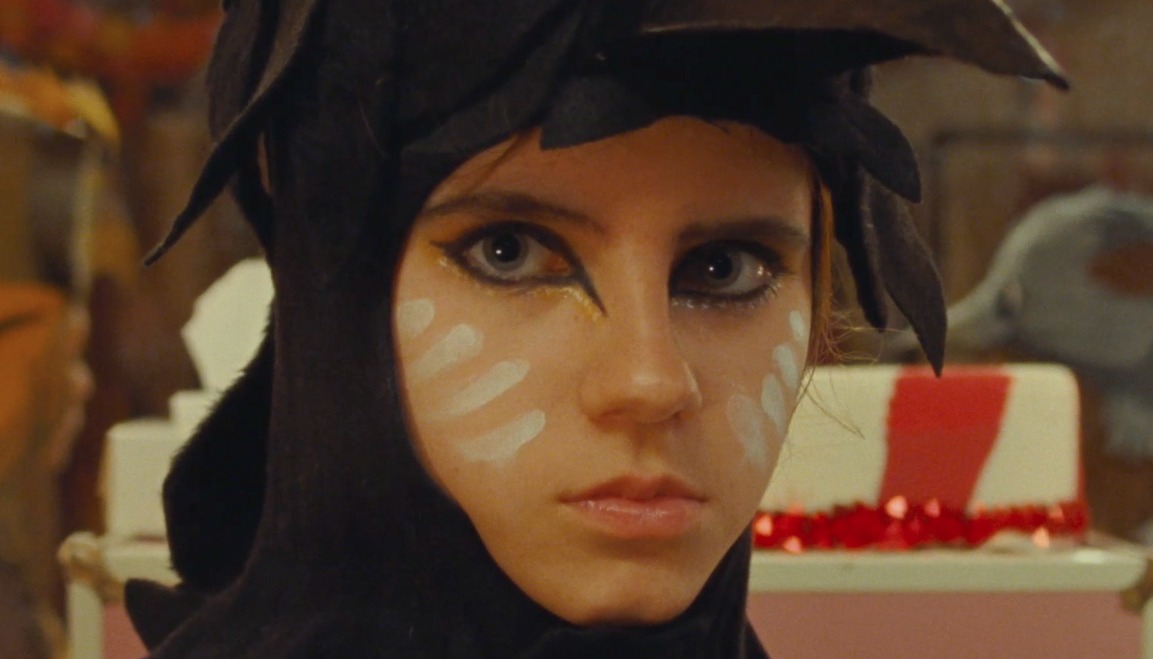
Like a cuddlier, funnier Kubrick, Wes Anderson has made a name for himself as a designer of rich, meticulously crafted tableaux. A miniaturist so deft as to make you feel like you’re slipping on a favorite old coat when you settle into his films, he’s come to be a sort of household name. His novel approach is one of many things that makes movie-going worthwhile: not simply “controversial” or “boundary-pushing,” but signature-framing devices and deadpan flair. Anderson proves there’s nothing wrong with artifice, especially when it’s as raw and ridiculous and cathartic as the story of Suzy and Sam. If there was a first here for the director, it was letting some new faces take center stage, while the well-known adult actors worked as side players. If one were to look deeper, this was actually a film about new loves and old loves, each rendered with their share of jaundice, but unwieldy and uncannily essential in their sensuality. Anderson may be a bit of a hyperstylist, but — similarly to Charlie Kaufman — he has a keen eye for stirring pathos and the subtler traits of human interaction. It’s all over his greatest efforts, and Moonrise Kingdom (TMT Review) was no exception.
02. The Master
Dir. Paul Thomas Anderson
[The Weinstein Company]

As of 2012, Paul Thomas Anderson stands as one of contemporary cinema’s great humanists. Since his 1996 debut feature Hard Eight (or Sydney to all you PTA-philes), his films have examined the inner natures of gamblers, porn stars, drug addicts, oil tycoons, and even Adam Sandler, with a sensitivity and compassion almost at odds with their sweeping camerawork and experimental techniques. His work can roughly be divided into two categories: the accessible (Boogie Nights, There Will Be Blood, Hard Eight) and the enigmatic (Magnolia, Punch-Drunk Love). Although this year’s The Master (TMT Review) likely belongs in the latter group, the film’s human center, anchored by the virtuoso performances we have come to expect from anyone cast by Anderson, shined through its sometimes impenetrable exterior. Freddy Quell’s (Joaquin Phoenix) psychic scars and longing for connection guided us through his bizarre odyssey of alienation from post-war American society. In Lancaster Dodd (Philip Seymour Hoffman), a comforting father figure loomed beneath the megalomaniac con artist, thus providing the draw for his pseudo-scientific, pseudo-Scientology cult known as The Cause. Their father-and-prodigal-son bond played out against narrative expectations, but ultimately, this might preserve the film in our memories. While nobody drank anyone’s milkshake, there was certain beauty to the dreamlike way the film ended, leaving us mesmerized as we stumbled out of the theater to swill up some homemade hooch.
01. The Turin Horse
Dir. Béla Tarr
[Cinema Guild]

Has any medium been more invested in our destruction than film? In its mere century-long history, the screen has imagined more apocalypses than the combined millennia of the world’s religions. Like the Book of Revelation, film’s destruction of the world has somehow always been prophecy: perpetually in our future, even when gaudy Technicolor or dated LCD screens belie decades of age, even when set in the past. The allure of these filmic extinctions is the glimpse (usually with sweeping aerial views of worldwide catastrophe) of what we will always be unable to see after the theater lights go on, a memory of what we shouldn’t remember. Even after watching an emotionally-crushing apocalypse like last year’s Melancholia, the act of walking out of the theater felt buoyant. The smells of concession stands. Brake lights in the parking lot. We survived.
Hungarian director Béla Tarr’s The Turin Horse offered no such relief in its vision of the end. Instead of the sensorial overload of apocalyptic spectacle, Tarr’s steady hand nearly imperceptibly choked us out, gradually stripping away all filmic distractions until all that was left was the clockwork routine of his protagonists’ daily struggle for sustenance, beating like the pulse in our blood-red faces. No explosions, no panicked masses, no super cool shots of the Earth from outer space. Only relentless wind, a stubborn horse, and a father and his daughter who dressed in near-rags, got water from a well, chopped wood, lit a lamp, and boiled potatoes that they ate with their fingers. Filmic apocalypses usually celebrate life’s pleasures before they explode them; Tarr reduced it to rote, familial labor whose boring fruits simply diminished into blackness.
For all its material and narrative paucity, The Turin Horse was hardly minimal. In his strongest films, Tarr is like a Richard Serra sculpting with celluloid, creating a sense of monumentality out of the sheer poundage of his film reels and the preposterous length of his shots. His 1994 film Sátántangó took over seven hours to go through a story that could’ve been comfortably condensed into a typical Hollywood runtime. Six years later, Werckmeister Harmonies filled two and a half hours with 39 shots. The Turin Horse had a mere 30 for the same runtime, and the director’s long shots have never been more technically jaw dropping or more essential to his material.
In Camera Lucida, the last book written by literary theorist Roland Barthes before his death in 1980, he constructs a personal phenomenology of photography: for him, the essence of the photograph is always the past, “that which has been.” Ultimately, that essence morphs into death itself: photography says “this is dead and that is going to die.” Yet film, he says — animated (not frozen in time) and not, like photography, collapsing all distance between the object represented and the medium of representation — escapes this.
He hadn’t seen Tarr’s films. In The Turin Horse, an eternity went by as the camera followed the daughter’s windblown silhouette walk through a field, and in this suspension of cinematic progression, she became frozen in time even while the minutes passed. The subjects of daguerreotypes, too, had to sit endlessly to become less than a moment. Unlike any other apocalypse on film, The Turin Horse revealed a past that has ended, not a future that will.
It’s not clear that anyone survived, especially the audience. The film’s father and daughter may or may not be 19th-century peasants, but the distance between them and audiences was more than a few hundred years. Their world had no pleasure or distraction; ours is mostly surplus. Tarr has made a career out of defiantly modernist storytelling that mostly withholds distraction from audiences or drives them to it. But after the last necessities of the family in The Turin Horse vanished and the theater’s lights went up, his oeuvre’s mudlike slowness and lack of modern sheen seemed to justify itself. After watching The Turin Horse, anything more than its monument to the monotony of survival seemed unthinkable (as did ever eating a boiled potato again).
In his book City of Quartz, historian Mike Davis discovers that the city that movies are most likely to destroy is Los Angeles. It’s not just our destruction filmmakers are drawn to — it’s their own. Béla Tarr has said that The Turin Horse is his final film; he has said he doesn’t want to “repeat himself,” but what’s more likely is that he never could. Rumors of the end times, most of them kinda jokey, defined 2012, but for film, it likely is the end, as film manufacturers close up shop and major movie studios make the switch to digital masters instead of film reels. For a director who’s said that the 11-minute time limit of the standard Kodak reel is “censorship,” that must truly be apocalyptic.
Entries on our 2012 film list like Your brother. Remember? and Doggiewoggiez! Poochiewoochiez! give us hope for the future of digital filmmaking. But there’s no more thrilling a memorial to technological progress’ destruction of celluloid than The Turin Horse’s laborious tedium.

We celebrate the end of the year the only way we know how: through lists, essays, and mixes. Join us as we explore the music and films that helped define the year. More from this series
